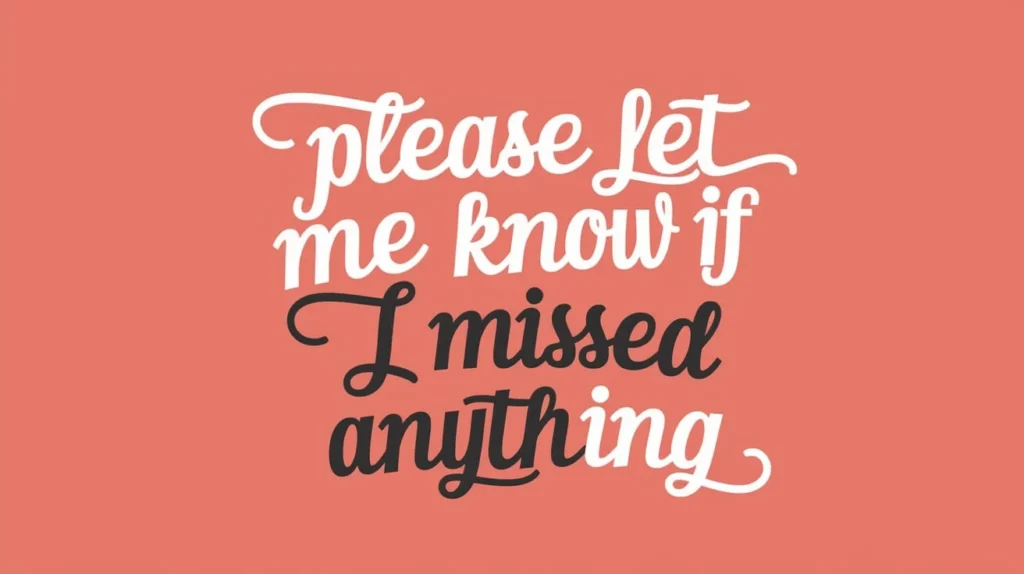Communication can be tricky—whether it’s at work or in casual conversations, we often want to make sure that we haven’t left anything out. This is where finding the right way to say “Please let me know if I missed anything” becomes important. The words we use can make our messages feel warmer, more thoughtful, and even more personal. And let’s be honest, we all appreciate when someone takes the time to make sure nothing slips through the cracks, right?
In this article, we’ll explore 20 different ways to express that same sentiment, but in ways that can add personality, empathy, and clarity to your message. Whether you’re sending a work email or responding to a friend, these alternatives will help you sound more conversational, thoughtful, and precise. Ready to get started?
What Does “Please Let Me Know if I Missed Anything” Mean?
Before we dive into alternatives, it’s helpful to understand what this phrase really means. When you say “Please let me know if I missed anything”, you’re offering the other person an opportunity to point out details that you might have overlooked.
It’s an invitation for feedback in a non-intrusive way. It shows that you care about their input and want to ensure everything is covered. But there are other ways to ask this that might better suit different situations or make your communication feel more natural.
Is It Professional/Polite to Say “Please Let Me Know if I Missed Anything”?
In most professional and casual settings, “Please let me know if I missed anything” is a perfectly polite phrase to use. It shows humility and openness to feedback, which is essential for clear and effective communication. It’s polite and thoughtful, giving the recipient space to highlight any overlooked details.
However, if you’re looking for a way to spice up your communication or make it sound more engaging, it might be worth exploring alternatives that still maintain professionalism while sounding a bit fresher.
Pros and Cons of Saying “Please Let Me Know if I Missed Anything”

Pros:
- Shows attentiveness and thoroughness
- Invites feedback
- Encourages collaboration
Cons:
- Can sound overly cautious if used excessively
- Might feel unnecessary if everyone involved is confident in the communication
Synonyms for “Please Let Me Know if I Missed Anything”
- Feel Free to Point Out Anything I Missed
- Let Me Know if Anything Was Overlooked
- Please Let Me Know If I Missed Any Important Details
- Let Me Know If There’s Anything I Didn’t Cover
- I’d Appreciate Your Feedback If I Missed Anything
- If I Overlooked Anything, Please Let Me Know
- Feel Free to Share Anything I Missed
- Let Me Know if I Left Anything Out
- Feel Free to Correct Me If I Missed Anything
- Please Inform Me If I Missed Anything Important
- Let Me Know If I Missed Any Key Points
- Feel Free to Add Anything I Missed
- Let Me Know If I Missed Any Details That Need to Be Added
- Please Let Me Know If There’s Anything I Forgot
- Please Feel Free to Let Me Know If I Missed Anything
- Let Me Know If I’ve Overlooked Any Details
- Please Let Me Know If There’s Anything You’d Like to Add
- If Anything’s Missing, Please Let Me Know
- If There’s Anything I Need to Add, Let Me Know
- Please Let Me Know If I Missed Anything in the Summary
1. “Feel Free to Point Out Anything I Missed”
This alternative offers a more laid-back, approachable way to ask if you’ve missed anything. It makes it clear that you’re open to feedback, and it’s a bit more informal. If you’re working with a team or speaking to someone you have a friendly relationship with, this is a great option.
Scenario Example
Hi Jack,
I’ve sent over the details of the project, but feel free to point out anything I missed or need to add.
Cheers,
[Your Name]
Best Use: Perfect for team projects or informal settings.
Additional Note: This phrase has a more friendly, conversational tone, so use it when you’re not aiming for overly formal communication.
2. “Let Me Know if Anything Was Overlooked”
Here’s a simple and effective alternative that keeps it straightforward. By asking someone to let you know if anything was overlooked, you sound like you’re giving them the chance to correct you, without sounding overly apologetic. It’s perfect when you’re looking for a quick confirmation.
Scenario Example
Hi Sarah,
I’ve summarized the report as discussed. Let me know if anything was overlooked or needs to be revised.
Best regards,
[Your Name]
Best Use: Use it when you want to confirm details without sounding like you’re doubting yourself.
Additional Note: A good middle ground between casual and professional.
3. “Please Let Me Know If I Missed Any Important Details”
This is a more specific version of the original phrase. By focusing on “important details,” it’s clear that you’re concerned about crucial points being missed. It shows that you care about the finer points, which is great when accuracy is key.
Scenario Example
Hi Tom,
I’ve gone through everything we talked about. Please let me know if I missed any important details that should be added.
Kind regards,
[Your Name]
Best Use: Ideal when you’re dealing with a lot of complex or important information.
Additional Note: It’s slightly more formal but still approachable.
4. “Let Me Know If There’s Anything I Didn’t Cover”
If you want to be direct and concise, this is a great option. It’s short, clear, and makes it easy for the recipient to pinpoint what might need additional attention.
Scenario Example
Hi Lisa,
I’ve attached the draft. Let me know if there’s anything I didn’t cover that needs to be included.
Best,
[Your Name]
Best Use: When you’re working on a document or deliverable that might require someone else’s input.
Additional Note: It’s a solid choice for when you want to keep things efficient.
5. “I’d Appreciate Your Feedback If I Missed Anything”
This variation adds a touch of gratitude. You’re not only asking for help but also expressing appreciation, which can encourage the recipient to take the time to review your work more carefully.
Scenario Example
Hi Mike,
I’ve reviewed the project details. I’d appreciate your feedback if I missed anything or if something needs more clarification.
Thanks,
[Your Name]
Best Use: When you’re working with colleagues and want to maintain a polite tone.
Additional Note: It’s a polite, professional way to ask for input.
6. “If I Overlooked Anything, Please Let Me Know”
This version is slightly more passive and focuses on the idea that you might have overlooked something. It’s a more subtle way to invite someone to help you ensure everything is covered.
Scenario Example
Hi Jennifer,
I’ve sent over the summary. If I overlooked anything, please let me know.
Best regards,
[Your Name]
Best Use: Perfect for when you’re working independently but want to double-check that your work is accurate.
Additional Note: It’s a gentle way to ask for help without sounding overly apologetic.
7. “Feel Free to Share Anything I Missed”
This phrase is a little more laid-back and informal, making it a good choice for casual communication with friends or close colleagues. It’s a gentle way to invite someone to offer corrections or additions.
Scenario Example
Hey Jake,
Here’s the plan I came up with. Feel free to share anything I missed or ideas for improvement.
Cheers,
[Your Name]
Best Use: Ideal for informal situations when you want to sound friendly.
Additional Note: Avoid this one in formal or very professional settings, as it might feel too casual.
8. “Let Me Know if I Left Anything Out”
This variation is another way to ask for confirmation but keeps things concise. It works great when you’re confident in your work but still want to ensure nothing was missed.
Scenario Example
Hi Carol,
I’ve gone over all the meeting notes. Let me know if I left anything out.
Best,
[Your Name]
Best Use: When you want to keep it short and sweet.
Additional Note: A straightforward way to check for missing details.
9. “Feel Free to Correct Me If I Missed Anything”
This option introduces a slight sense of humility by using the word “correct.” It invites feedback in a way that sounds both open and receptive to others’ opinions.
Scenario Example
Hi Peter,
I’ve drafted the outline for our project. Feel free to correct me if I missed anything.
Thanks,
[Your Name]
Best Use: When you want to appear open to constructive criticism.
Additional Note: It’s friendly but still conveys that you value the other person’s opinion.
10. “Please Inform Me If I Missed Anything Important”
This version is a little more formal, using “inform” to elevate the tone. It’s useful when you want to sound professional and respectful, especially in more formal business or corporate settings.
Scenario Example
Hi Emily,
I’ve outlined the main points from our meeting. Please inform me if I missed anything important.
Best regards,
[Your Name]
Best Use: Ideal for formal business correspondence.
Additional Note: The use of “inform” makes this option a bit more formal than some of the others, so use it when you need a more polished approach.
11. “Let Me Know If I Missed Any Key Points”
This phrase narrows the focus to “key points,” emphasizing the most important parts of your message. It shows you’re focused on the crucial details, while still being polite and open to feedback.
Scenario Example
Hi Alex,
I’ve compiled all the feedback from the team. Let me know if I missed any key points or things that need further discussion.
Best,
[Your Name]
Best Use: When discussing essential details and wanting to ensure that everything critical is captured.
Additional Note: This version is concise and efficient while still sounding professional.
12. “Feel Free to Add Anything I Missed”
This phrase is an open invitation for the recipient to contribute anything they feel is necessary. It sounds friendly and collaborative, which is great for working in teams or with individuals where input is valued.
Scenario Example
Hi Rachel,
I’ve finished the proposal. Feel free to add anything I missed before we send it off.
Thanks,
[Your Name]
Best Use: When you’re working in a group and want to encourage participation from others.
Additional Note: It’s casual but not too informal—perfect for teamwork.
13. “Let Me Know If I Missed Any Details That Need to Be Added”
This variation focuses more on the details that might need to be added, rather than just a general check. It’s more specific, which makes it a great choice for when you’re trying to catch any tiny but important elements.
Scenario Example
Hi David,
I’ve included all the important details in the report. Let me know if I missed any details that need to be added.
Best,
[Your Name]
Best Use: Ideal for situations where every little detail matters.
Additional Note: This is a bit more detailed and focused on accuracy.
14. “Please Let Me Know If There’s Anything I Forgot”
Short, sweet, and direct, this alternative is a great way to ask for feedback without overthinking things. It’s less formal and more relaxed, making it suitable for casual professional settings or friendly exchanges.
Scenario Example
Hey John,
I’ve sent over the project details. Please let me know if there’s anything I forgot to include.
Best,
[Your Name]
Best Use: Casual professional settings or when you’re communicating with peers.
Additional Note: It’s simple and doesn’t come across as overly formal, making it approachable.
15. “Please Feel Free to Let Me Know If I Missed Anything”
This version puts a bit more emphasis on the recipient’s ability to offer feedback. By saying “please feel free,” it encourages the other person to speak up without hesitation. It’s a polite way to ask for input while making the other person feel comfortable doing so.
Scenario Example
Hi Nina,
I’ve outlined the action steps from our meeting. Please feel free to let me know if I missed anything or if you have any additional thoughts.
Best regards,
[Your Name]
Best Use: When you want to invite feedback in a very open, non-pressuring way.
Additional Note: A more polite, less direct approach that sounds warm and approachable.
16. “Let Me Know If I’ve Overlooked Any Details”
This alternative is pretty close to some of the others we’ve seen, but it adds a slight air of humility by using “I’ve overlooked.” It’s a way of showing that you recognize the possibility of missing something but are open to correction.
Scenario Example
Hi Ben,
I’ve reviewed all the details of the event planning. Let me know if I’ve overlooked any details that should be included.
Best,
[Your Name]
Best Use: When you want to show humility and invite helpful feedback.
Additional Note: This version is a little softer and can be used when you don’t want to seem too confident.
17. “Please Let Me Know If There’s Anything You’d Like to Add”
This phrase puts the focus on the other person’s input. Instead of just asking if something is missing, you’re offering them the opportunity to add anything they think is important. It’s inclusive and collaborative.
Scenario Example
Hi Olivia,
I’ve drafted the outline for the meeting. Please let me know if there’s anything you’d like to add or if you have any thoughts.
Best regards,
[Your Name]
Best Use: When you want to show that you value the other person’s ideas and opinions.
Additional Note: This version is more collaborative and shows you care about the other person’s input.
18. “If Anything’s Missing, Please Let Me Know”
This alternative is one of the simplest and quickest ways to ask for feedback. It’s straightforward, without a lot of extra wording. Perfect when you don’t need to overcomplicate things.
Scenario Example
Hi Mark,
I’ve completed the project summary. If anything’s missing, please let me know so I can make the necessary adjustments.
Thanks,
[Your Name]
Best Use: Use when you want to keep things simple and efficient.
Additional Note: It’s direct, so avoid it if you need a more formal tone.
19. “If There’s Anything I Need to Add, Let Me Know”
This version suggests that you might need to add something, but it leaves the responsibility on the recipient to point it out. It’s casual yet considerate.
Scenario Example
Hi Helen,
I’ve put together the meeting notes. If there’s anything I need to add, let me know and I’ll make the changes.
Best,
[Your Name]
Best Use: When you want to stay flexible and are open to making changes.
Additional Note: It’s polite and not too demanding, making it approachable.
20. “Please Let Me Know If I Missed Anything in the Summary”
This one is specific to situations where you’re providing a summary, ensuring that you’ve covered everything important. It works particularly well when summarizing meetings, discussions, or projects.
Scenario Example
Hi Steve,
I’ve summarized everything we discussed. Please let me know if I missed anything in the summary, and I’ll add it.
Kind regards,
[Your Name]
Best Use: Great for meeting or project summaries where you want to make sure you’ve captured all key points.
Additional Note: Ideal for situations requiring clear, organized summaries.
Conclusion
As we wrap up, it’s clear that there are plenty of thoughtful, warm, and respectful alternatives to saying “Please let me know if I missed anything.” Each of these alternatives offers a unique way to communicate with care, attention, and professionalism—whether you’re working in a formal or informal setting.
With these options, you can tailor your message to the tone and situation, ensuring that your communication is both accurate and considerate.















